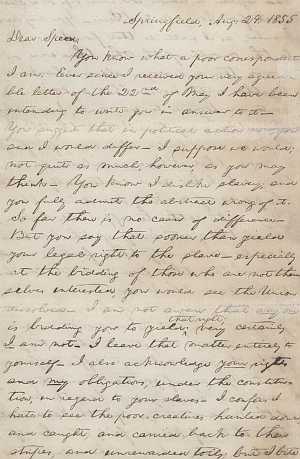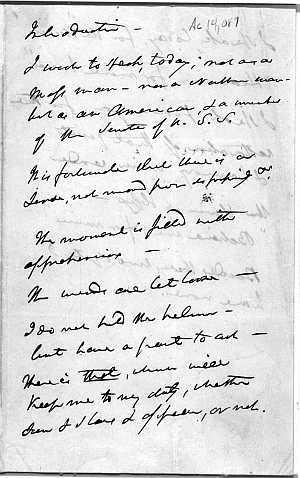Your Friend Forever
Introduction
By the 1850s the future of the Union is at stake. While the abolitionists declare "NO UNION WITH SLAVEHOLDERS," there are others who work to preserve this fragile young country at all costs. It is difficult and often unpopular work, and compromise is often necessary. Abraham Lincoln, a lawyer in Illinois, writes about this complicated situation to his old friend Joshua Speed. Daniel Webster, a senator from Massachusetts, writes notes to himself to introduce a speech supporting the Compromise of 1850.
Documents
Questions to Consider
CONTENT:
- Read pages 1, 2, 7, and 8 in Lincoln's letter to Speed. What are the three most important things that Lincoln wants to say to his friend?
- What is the key point that Webster knows he must make in the speech?
CONTEXT:
- Lincoln writes a good deal about Kansas and Nebraska in this 1855 letter. What is happening in those territories, and why does he feel that recent actions have destroyed the Missouri Compromise? Why is he opposed to this? Why is Lincoln adamant that he is not a Know-Nothing? Why does he write this line on page 8: "When it comes to this I should prefer emigrating to some country where they make no pretence of loving liberty -- to Russia, for instance, where despotism can be taken pure, and without the base alloy of hypocracy"?
- What is the Compromise of 1850? What provisions does it contain?
CONSIDERATIONS:
- What things can Lincoln say to his trusted friend that he cannot say in public? Why is this so?
- Why does Webster throw his support to the Compromise of 1850? What does his biographer George Ticknor Curtis mean by this note on page 3: "This is the exordium [beginning] of Mr. Webster's celebrated speech of the 7th of March 1850, which cost him the favor of New England"? What did it cost Webster, and why?
CONVERSATIONS:
- What are the key points on which Lincoln and Speed disagree? On what points is Lincoln convinced they would agree? What makes it possible for Lincoln and Speed to remain friends even though they have very different positions on slavery? What is the meaning of Lincoln's signoff: "And yet let me say I am/Your friend forever"?
- To whom is Webster’s speech directed? How does the final version of the speech (the beginning section) differ from the version in Webster’s notes?
CONNECTIONS:
- Describe the dilemmas faced by both Lincoln and Webster and the similarities and differences in their private and public positions on slavery. How did each of them act to preserve the Union (before, during, and after the creation of these two documents), and what were the consequences for them and for this country?
 Selection from the Massachusetts Historical Society: Letter from Abraham Lincoln to Joshua Fry Speed, 24 August 1855.
Selection from the Massachusetts Historical Society: Letter from Abraham Lincoln to Joshua Fry Speed, 24 August 1855. Selection from the Library of Congress: Daniel Webster's notes for his speech to the United States Senate favoring the Compromise of 1850, 7 March 1850.
Selection from the Library of Congress: Daniel Webster's notes for his speech to the United States Senate favoring the Compromise of 1850, 7 March 1850.